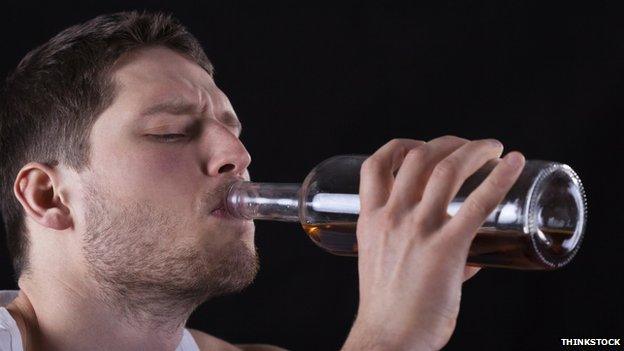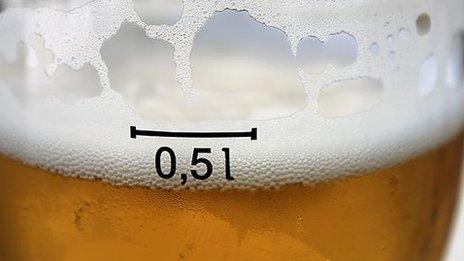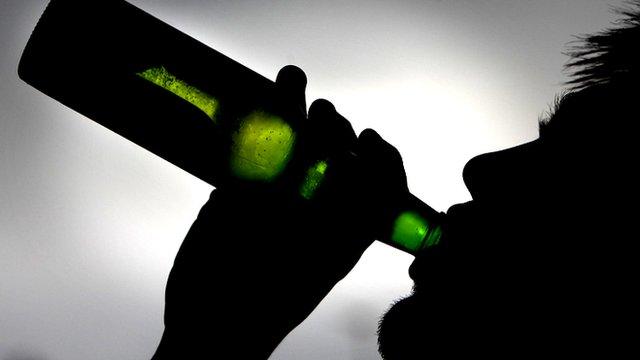Early detection of liver disease by GPs 'non-existent'
- Published

Early detection of liver disease by GPs in the UK is "virtually non-existent", leading medical experts warn.
A group of doctors and researchers have criticised a reliance on "outdated" blood tests for diagnosis - saying these sometimes give false reassurance.
Their report in The Lancet, external says the UK has one of the worst death rates from liver disease in Europe.
GPs' leaders agree that family doctors need better access to diagnostic tools.
Liver disease cases are often related to alcohol consumption or obesity. The illness can also be caused by the hepatitis B and C viruses.
The report says liver disease is already the UK's third most common cause of premature death, with the number of fatal cases rising.
Most lives lost are among people of working age.
Find cases early
The report quotes NHS figures that say 600,000 people in England and Wales have some form of liver disease. About 10% of them have cirrhosis.
Greg Buckley on how he used to drink four cans of extra strong lager each day
Liver disease was behind 57,682 hospital admissions and 10,948 deaths in 2012.
The report says picking up cases earlier leads to better outcomes for patients.
Prof Roger Williams, who led the research and is the director of the Institute of Hepatology in London, said: "The rising rates of mortality from liver disease over the past three decades are a terrible reflection on the UK.
"Deaths will continue to rise until there are radical improvements in treatment services.
"Hospital care for patients with advanced liver disease has been shown to be less than good in more than half of cases.
"And early detection of liver disease by GPs and primary care services is virtually non-existent.
"GPs know very little about it and don't particularly want to get involved.
"The ordinary test for liver function often shows as normal - even when someone has cirrhosis."
The report says GPs rely on blood tests that show inflammation to the liver, which can fluctuate, rather than having access to scanners, which give a more consistent picture of scarring.
'Outdated' technology
Another member of the team, Dr Nick Sheron, who runs the liver unit at Southampton General Hospital, said: "GPs don't have access to the right technology.
"They are using blood tests which simply don't work. It's 19th Century technology for a 21st Century problem."
The experts also want politicians to set a minimum price for a unit of alcohol and to tax sugary drinks.
Their report also calls for drugs and vaccination against hepatitis viruses to be made available on the NHS.

'Reduce drinking'
Prof Sir Ian Gilmore, who co-founded the Alcohol Health Alliance UK, said: "Getting people to reduce their drinking works and is really cost-effective.
"But our politicians will not take this seriously.
"Alcohol dependency is treated as a lifestyle choice - like a designer brand of jeans - rather than as a disease."
Public Health England welcomed the report and said it would work with the doctors.
Its lead for liver disease, Prof Julia Verne, said: "These cases involve a marginalised group of people who are often hard to reach."
She added: "10% of people who die from liver disease have had no admissions to hospital in the last year of their life - showing they have not been picked up at all."
Dr Imran Rafi, chairman of the Royal College of GPs' Clinical Innovation and Research Centre, said: "It is clear that more needs to be done to identify this condition as early as possible in adults - and to tackle the negative effects that alcohol consumption and obesity can have across society.
"With the resources available to us, it is difficult for GPs to identify liver disease in its early stages.
"So it is welcome that the report recognises the need for GPs and practice teams to have better access to diagnostic and screening tools.
"Our influence is limited. It is politicians who need to act now and introduce measures to really make a difference."
- Published14 June 2013

- Published21 November 2012
